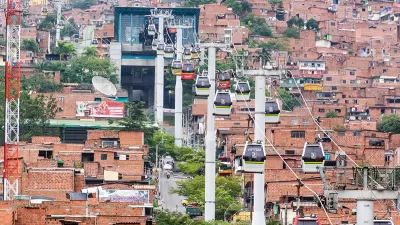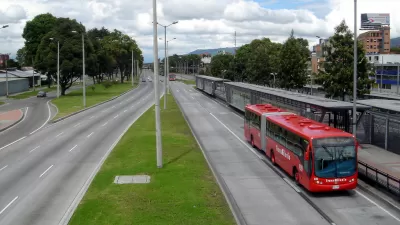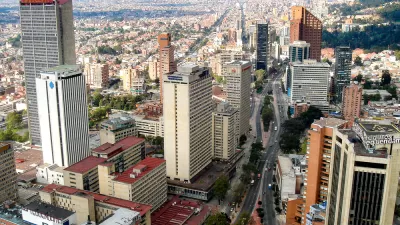The cities of Bogotá and Medellín have made dramatic transformations over the last ten years, driven in large part by their influential mayors. But while one continues to soar, the other is in crisis, reports Justin McGuirk
Two cities in Colombia showcase how the mix of politics and good infrastructure design can work. Bogota, Colombia's capital, utilized transport infrastructure to revitalize their streets. Two past mayors, Antanas Mockus and Enrique Peñalosa, "brought decent sidewalks, bike lanes and the Transmilenio bus service to bypass the capital's crippling traffic – measures that privileged the non-car-owning poor." With current overcrowding, various stalled road projects and the last mayor accused of corruption, Bogota is a city in trouble.
By comparison, Medellin was considered a dangerous city filled with violence and drugs in the 1990s. By the early to mid 2000s, progressive design projects such as Coliseos Juegos Suramericanos, Orquideorama, and Paisajes Emergentes swimming pool complex, led the city's revival, notes McGuirk.
Giancarlo Mazzanti, Colombia's renowned architect, says the focus on "social urbanism" reflected in these projects marks a critical shift in urban policy, "This is a massive U-turn since the days when it was common to speak of 'cutting out the cancer' of the slums. For once, architecture-as-spectacle is not being used as a tool to market the culture industry, but to make poverty visible."
In the hands of mayor Sergio Fajardo, Medellin became a proving ground for innovative urban design. "There are several hybrid library-parks (part community centres and part much-needed public spaces), two cable car systems and, most recently, an outdoor escalator running nearly 400m up the troubled slum of Comuna 13." Fajardo focused on the creation of public spaces for the poor and "he attributed the fall in crime during his term in part to the increase in the amount of public space per citizen."
FULL STORY: Colombia's architectural tale of two cities

Maui's Vacation Rental Debate Turns Ugly
Verbal attacks, misinformation campaigns and fistfights plague a high-stakes debate to convert thousands of vacation rentals into long-term housing.

Planetizen Federal Action Tracker
A weekly monitor of how Trump’s orders and actions are impacting planners and planning in America.

In Urban Planning, AI Prompting Could be the New Design Thinking
Creativity has long been key to great urban design. What if we see AI as our new creative partner?

Massachusetts Budget Helps Close MBTA Budget Gap
The budget signed by Gov. Maura Healey includes $470 million in MBTA funding for the next fiscal year.

Milwaukee Launches Vision Zero Plan
Seven years after the city signed its Complete Streets Policy, the city is doubling down on its efforts to eliminate traffic deaths.

Portland Raises Parking Fees to Pay for Street Maintenance
The city is struggling to bridge a massive budget gap at the Bureau of Transportation, which largely depleted its reserves during the Civd-19 pandemic.
Urban Design for Planners 1: Software Tools
This six-course series explores essential urban design concepts using open source software and equips planners with the tools they need to participate fully in the urban design process.
Planning for Universal Design
Learn the tools for implementing Universal Design in planning regulations.
Gallatin County Department of Planning & Community Development
Heyer Gruel & Associates PA
JM Goldson LLC
City of Camden Redevelopment Agency
City of Astoria
Transportation Research & Education Center (TREC) at Portland State University
Jefferson Parish Government
Camden Redevelopment Agency
City of Claremont





























